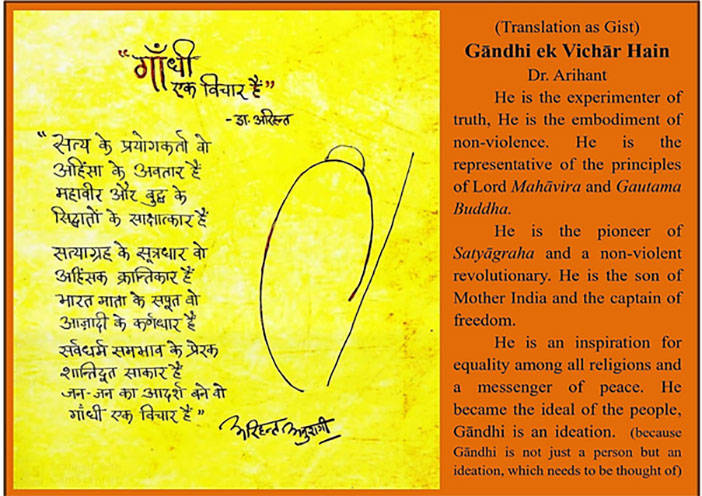Gandhi must have interacted with several Jains like Dr. Pranjivan Mehta, (described as a friend, guide, and benefactor by Gandhi). He acknowledged the role played by Dr. Mehta in advising him to plan and start Salt Tax Removal and Hind Swaraj movements many years before Gandhi practiced them. Dr. Mehta also supported him financially in setting up Phoenix and Sabarmati Ashrams and Gujarat Vidhyapeeth. Similarly, Sheth Ambalal Sarabhai donated significantly when Gandhi started his movement to abolish untouchability (as other Hindu donors refused to support his movement financially); Ambalal’s sister Anusuyaben and daughter Mridula were always there to support Gandhi’s Satyagraha. Mahasati Ujjawala during his month-long sojourn in Birla House Bombay in 1944 indicated Jain impact on him. These are just a few names we have come across. Similarly, we found many instances when Gandhi addressed Jains to become better Jains by practicing Ahimsa and Aparigraha as pronounced by Mahavira. However, constrained as most of the Jains in Western and Southern India do not write Jains as their surnames. (Jain, 2017) In this way, many known and unknown people came into Gāndhi’s life, from whose noble philosophy of life, Gāndhiji took inspiration and conceptualized freedom by using those principles in transparent politics.
Applications of Jain principles to Gāndhi’s life and activism :
Ahimsa: The Core of Gāndhi’s Philosophy:
The most significant influence of Jainism on Gāndhiji’s life was the concept of ahimsa or non-violence. In Jainism, ahimsa is not just the absence of physical violence but also the avoidance of any harm to living beings, including through speech and thought. This principle deeply resonated with Gāndhi, who adopted it as the central pillar of his philosophy. Drawing from Jain concepts of compassion and respect for all life forms, Gāndhi demonstrated how nonviolent resistance could be a powerful tool for social and political change.
Gāndhiji’s commitment to non-violence was evident in his various movements, including the Salt March, Quit India Movement, and Civil Disobedience Movement. He encouraged Indians to resist British oppression through non-violent means, such as civil disobedience, fasting, and peaceful protests. He believed in resolving conflicts and achieving social and political change through nonviolent means, even in the face of extreme adversity. This idea was rooted in his exposure to Jain teachings on compassion and the interconnectedness of all life.
Satya and Truth-Seeking: Jainism emphasizes the importance of truthfulness in thoughts, speech, and actions. Gāndhi’s Satyagraha campaigns were influenced by Jain ideals of truthfulness and righteousness. Gāndhiji’s search for truth even in the face of adversity reflects the Jain principles of truth. The search for truth is a central theme in Gāndhi’s ‘Experiments with Truth’. He believed that one should be truthful not only in words but also in thoughts and actions.
Jainism’s practice of introspection and self-purification deeply influenced Gāndhi’s method of introspection and his belief that personal change is a prerequisite for social change. His commitment to truth can be seen through his experiments of self-restraint, his honesty in dealing with the colonial authorities and his efforts to bridge religious and communal divides through open dialogue. His unwavering dedication to truth not only inspired the Indian masses but also garnered international support for India’s independence movement.
Aparigraha: Non-Possession and Simplicity: Gāndhi’s choice to live a simple and austere life was greatly influenced by the Jain principle of Aparigraha, or non-possession. Jain monks practice extreme renunciation and detachment from material possessions. While Gāndhi did not adopt the extreme lifestyle of Jain ascetics, he embraced simplicity, wore humble clothing, and advocated for economic self-sufficiency. He believed that a life free from excessive materialism could lead to a deeper understanding of human needs and promote social harmony.
Self-Discipline, Self-Purification, and Spiritual Growth: Jainism places a strong emphasis on self-discipline and self-purification as a means of attaining spiritual growth. Gāndhi’s practice of self-restraint, fasting, and self-purification was influenced by these Jain principles. His hunger strikes, undertaken as a form of nonviolent protest, were an extension of his commitment to self-discipline and his willingness to suffer for the greater good.
His austere lifestyle set an example for his followers, instilling a sense of discipline and self-sacrifice in the pursuit of a just society. This commitment to self-discipline also played a vital role in the success of the Indian independence movement.
Vegetarianism: Gāndhi adopted a vegetarian diet, influenced by his respect for all forms of life, a value shared with Jainism. His commitment to vegetarianism was not only a personal choice but also a statement against the exploitation of animals.
Tolerance and Religious Pluralism: Jainism promotes religious tolerance and coexistence. Mahatma Gandhi’s pluralistic approach was indeed influenced by the philosophical concept of “Anekantavada,” often translated as “the doctrine of non-absolutism” or “the doctrine of manifold aspects,” which is a fundamental idea in Jain philosophy. Its emphasis is on embracing the complexity of truth and respecting diverse perspectives. Gāndhi embraced these ideals of Anekantvada and advocated for religious harmony and unity among diverse communities in India. He believed in the value of respecting all religions and saw them as different paths to the same truth.
Compassion and Selfless Service (Seva): Jainism emphasizes compassion and selfless service to others, reflecting the interconnectedness of all beings. Gāndhi’s commitment to serving humanity, especially the marginalized and oppressed, aligns closely with Jain ideals of seva. His establishment of ashrams and emphasis on manual labor as a form of spiritual practice was reminiscent of Jain community service traditions.
Influence on Transformative Leadership: Gāndhi’s application of Jain principles of nonviolence, truth, self-discipline, and selfless service exemplifies the transformational potential of integrating spiritual values into leadership. His ability to mobilize the masses and effect change through peaceful means is a testament to the enduring relevance of Jain teachings in contemporary social and political contexts.
Gāndhi : The Synonym of Ahimsā :
Gāndhi’s ahimsā reflected in this popular song composed by poet Pradeep which is worded as ‘Dedi hame azadi bina khadga bina dhal, Sabarmati ke sant tune kar diya kamal’ (O! Saint from Sabarmati, You did wonder by giving us the freedom without the use of sword or the shield). (Jain, 2017) Today, Gāndhiji’s legacy lives on, continuing to inspire individuals and movements around the world that seek social justice, human rights, and peace. The legacy of this influence continues to inspire individuals and movements worldwide, highlighting the enduring power of nonviolence and ethical principles in effecting positive change. United Nations also declared The International Day of Non-Violence on 2 October, the birthday of Mahātmā Gāndhi. According to General Assembly resolution A/RES/61/271 of 15 June 2007, which established the commemoration, International Day is an occasion to “disseminate the message of non-violence, including through education and public awareness”. The resolution reaffirms “the universal relevance of the principle of non-violence” and the desire “to secure a culture of peace, tolerance, understanding and non-violence”. (Nations)
The influence of Jain values on Gāndhi’s ‘Experiment with Truth’ is undeniable. These values not only shaped his personal life but also transformed the destiny of a nation. While Gāndhi was not a Jain in terms of religious affiliation, the education of ‘Jain values’ provided him with a philosophical framework aligned with his convictions about nonviolence, truth, simplicity, and self-discipline. These principles guided his actions, from his early struggles in South Africa to his leadership in India’s fight for independence. Gāndhi’s synthesis of Jain ideals with his own interpretations became a driving force in his efforts to create a just and equitable society. The role of Jain values in Gāndhiji’s movements is a testament to the enduring power of ancient wisdom to effect positive change in the modern world. In conclusion, I would like to express my tribute to Gāndhiji through a poem titled “Gāndhi ek Vichār Hain” (Gāndhi is ideation), which I wrote a few years ago :


 Shrimad Rajchandra (Jain Spiritual Guru) : In the year 1891, the young barrister Gāndhi returned to India from England. He met Jain Spiritual Guru Shrimad Rajchandra. This meeting later turned into an enduring bond that lasted till the death of Shrimad Rajchandra. Shrimad Rajchandra made him aware of the principles of Jainism and that was to give him inner strength which was to sustain him all through his life. Shrimad’s simplicity and vast erudition drew Gāndhi closer to him. Gāndhi then experimented with the ‘Five Anuvrata’s’ – Ahimsā (non-violence), Satya (Truth), Asteya (Non-Stealing), Brahmacharya (celibacy), and Aparigraha (non-possession) practically, and these values were to guide him all through his life. A new dawn of change was thus ushered in. Gāndhiji accepted him as his spiritual guru. He said: “I cannot describe the impact that he has left on my life. I have been searching for a truly religious man for a long time but haven’t come across any other except him.” (Desai, 2003) In Gāndhi’s Autobiography, he writes “I have tried to meet the heads of various faiths, and I must say that no one else has ever made in me the impression that Rajchandra Ji did. In my moments of spiritual crisis, therefore he was my refuge”. (Gandhi, 1948)
Shrimad Rajchandra (Jain Spiritual Guru) : In the year 1891, the young barrister Gāndhi returned to India from England. He met Jain Spiritual Guru Shrimad Rajchandra. This meeting later turned into an enduring bond that lasted till the death of Shrimad Rajchandra. Shrimad Rajchandra made him aware of the principles of Jainism and that was to give him inner strength which was to sustain him all through his life. Shrimad’s simplicity and vast erudition drew Gāndhi closer to him. Gāndhi then experimented with the ‘Five Anuvrata’s’ – Ahimsā (non-violence), Satya (Truth), Asteya (Non-Stealing), Brahmacharya (celibacy), and Aparigraha (non-possession) practically, and these values were to guide him all through his life. A new dawn of change was thus ushered in. Gāndhiji accepted him as his spiritual guru. He said: “I cannot describe the impact that he has left on my life. I have been searching for a truly religious man for a long time but haven’t come across any other except him.” (Desai, 2003) In Gāndhi’s Autobiography, he writes “I have tried to meet the heads of various faiths, and I must say that no one else has ever made in me the impression that Rajchandra Ji did. In my moments of spiritual crisis, therefore he was my refuge”. (Gandhi, 1948)


Can you be more specific about the content of your article? After reading it, I still have some doubts. Hope you can help me.